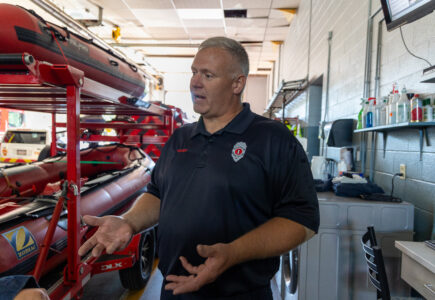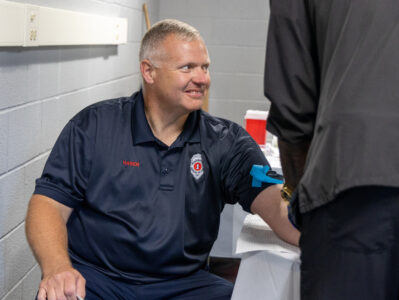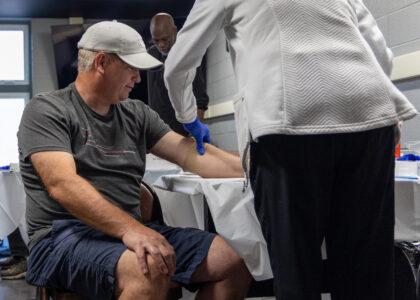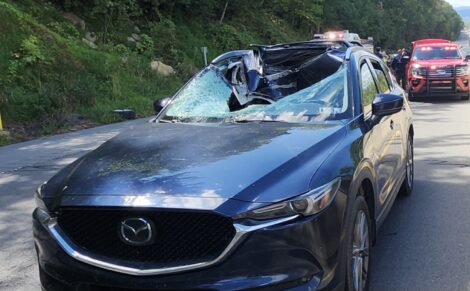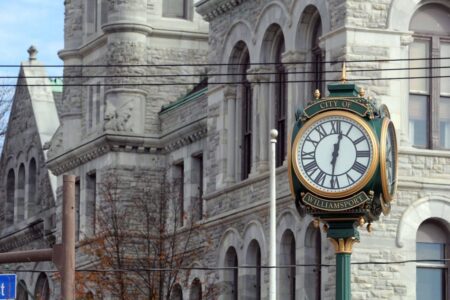Williamsport firefighters get pre-cancer screenings
- KAREN VIBERT-KENNEDY/Sun-Gazette Tracey Harer, president of the Williamsport Firefighters Local 736, talks about the importance of health screenings at for active and retired firefifghters on Wednesday.
- KAREN VIBERT-KENNEDY/Sun-Gazette Tracey Harer, president of the Williamsport Firefighters Local 736, shares a laugh while having blood taken at the fire department o. Wednesday.
- KAREN VIBERT-KENNEDY/Sun-Gazette’ Williamsport firefighter John McCann has blood taken for cancer screenings at the fire department in WillIamsport on Wednesday.
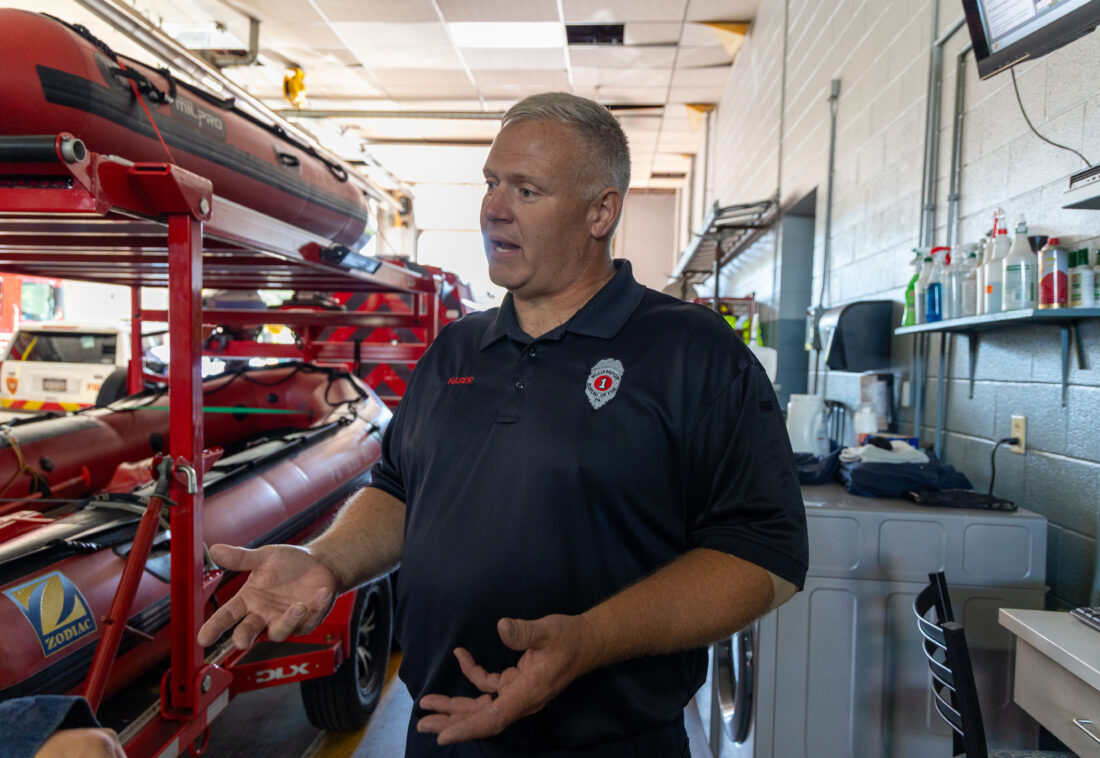
KAREN VIBERT-KENNEDY/Sun-Gazette Tracey Harer, president of the Williamsport Firefighters Local 736, talks about the importance of health screenings at for active and retired firefifghters on Wednesday.
It was a day long in the making as members past and present of the Williamsport Bureau of Fire received potentially life-saving pre-cancer screenings.
The screenings, known as Galleri, test for early signs of more than 50 of the most aggressive forms of cancer, including esophageal, head and neck and pancreatic, through a simple blood test.
The tests were performed by Grail, a nation-wide organization founded in 2016, and dedicated to the early detection of cancer, according to Jess Teel, assistant director of national events.
“When it comes to the first responders, they put their lives on the line for us every day. The least we can do is protect them,” Teel said.
Teel has a personal motivation to carry out this work, as the husband of her childhood best friend, also a firefighter, passed away from brain cancer prior to his son’s 15th birthday.
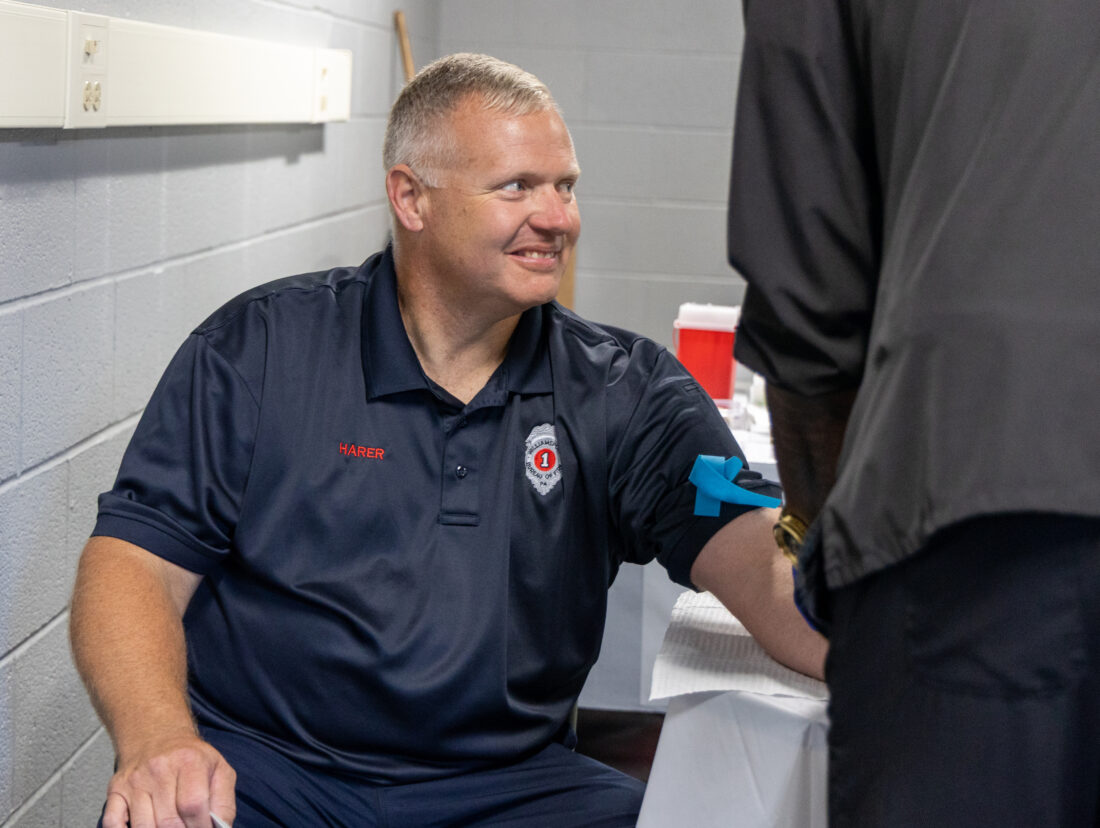
KAREN VIBERT-KENNEDY/Sun-Gazette Tracey Harer, president of the Williamsport Firefighters Local 736, shares a laugh while having blood taken at the fire department o. Wednesday.
“It’s been his son’s mission to get this test to every department he can in the state of California,” she said.
While cancer affects people from all walks of life, firefighters are at an increased risk of developing a number of different types due to not only their exposure to smoke and its byproducts, but also chemicals known as PFAs or polyfluoroalkyl substances.
These chemicals are created during the production of firefighter PPE.
Exposure to PFAs has been linked to a number of health conditions, including liver damage, immune system suppression, higher cholesterol levels and most notably in the firefighting community, cancer, making these screenings even more important for those that serve.
“When you look at our little department, where there’s around 62 people, including retirees, and we’re getting one to two guys a year that are diagnosed with cancer, there’s a reason why this is happening, and it’s because of the things we’re exposed to. So it’s really important we do this now,” Local 736 Firefighters Union President Tracey Harer said, stressing that the survivability of stage one cancer is 82% versus 19% for those diagnosed at stage four.
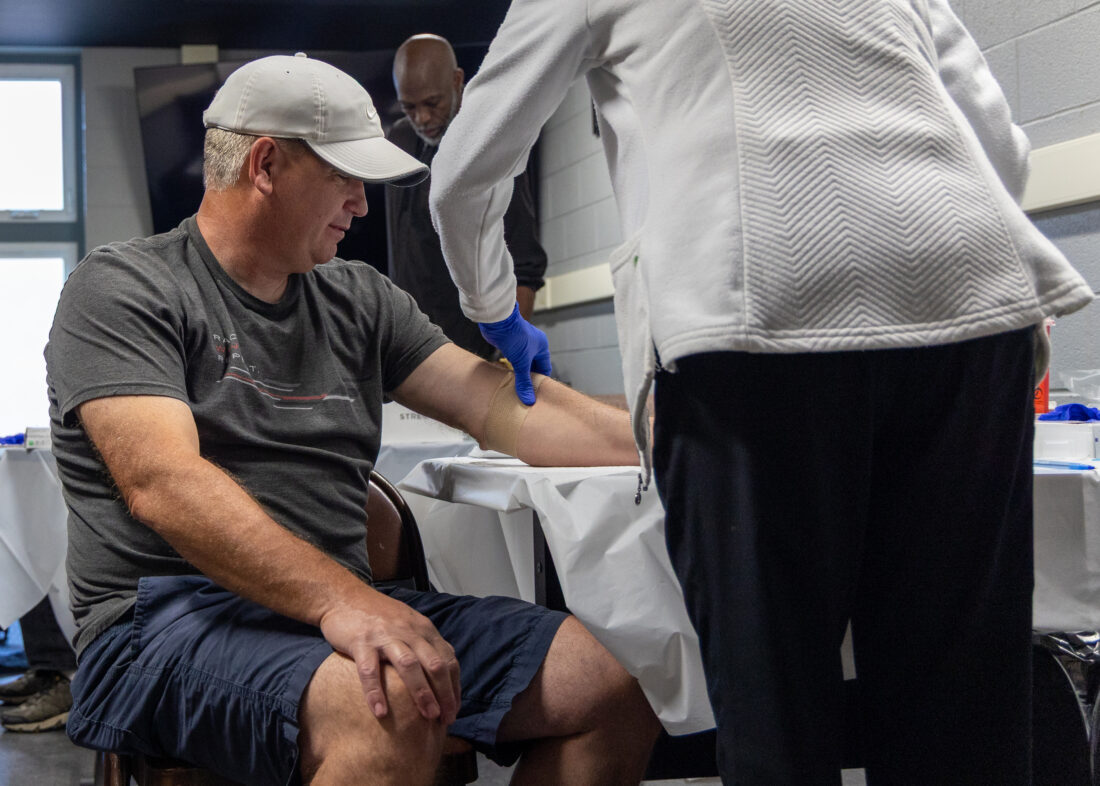
KAREN VIBERT-KENNEDY/Sun-Gazette' Williamsport firefighter John McCann has blood taken for cancer screenings at the fire department in WillIamsport on Wednesday.
“Anytime you can detect cancer early, you’re saving lives and saving money,” Teel said.
“We can catch cancer before you have symptoms,” she explained.
The tests work by looking for DNA shed by any cancerous cells present in the body.
“The more aggressive the cancer, the more it sheds, and our test is like a screenshot that tells you the location and the type of cancer,” Teel explained.
Teel stressed that these tests are not only life-saving for the individual, but their loved ones, as well.
“Their families, their wives, their children are at higher risk than the average, because they bring that stuff home,” she said.
“To be part of this mission, I feel like I’m giving back for my best friend, for her husband and for those that serve the community every day without hesitation,” Teel said, adding that she hopes to one day offer these screenings to veterans, as well.
A major hurdle to get to this point has been securing funding for the tests, which typically run about $900 per person, and are not covered by insurance due to the recipient being non-symptomatic, according to Harer, who said public donations, as well as a relationship with Foundation 58 was vital in making this day happen.
The non-profit helps to cover costs incurred due to cancer that insurance does not, including hotel stays for family members of those undergoing treatment.
“Today’s testing is going to be roughly $41,000, and there’s another one in October,” Harer said, adding that total costs, including the three recommended tests for firefighters, would cost the department around $240,000 for just one round of testing.
After receiving a baseline reading from the first tests, it is recommended testing be repeated every three to four years.
“We’re working with legislators on Capitol Hill. We work with the Professional Pennsylvania Professional Firefighters, and we work with our local leaders, including state representatives Joe Hamm, R-Hepburn Township, Jamie Flick, R-South Williamsport, and Senator Gene Yaw, R-Loyalsock Township. They have all been very supportive, and they understand what our needs are. It’s just a matter of, how do we fund it going forward,” Harer said.
A piece of legislation, aimed at strengthening health and safety standards for public employees, introduced last year by state Rep. Pat Harkins, D-Erie, had broad support, even among insurance companies, but was shot down when it was revealed that it would only cover about 20% of the people the bill was geared towards, Harer explained.
“They understood what we’re trying to do and that it’s going to save them money in the long run, so they’re not fighting us on it. It’s just a matter of finding how to write it,” he explained.
Recent federal cuts have also threatened several firefighting safety initiatives such as the loss of 85% of the National Institute for Occupational Safety and Health’s workforce under the directive of Health and Human Services Secretary Robert F. Kennedy Jr., the Associated Press reported in April.
“The layoffs are stalling — and perhaps ending — many programs, including a firefighter cancer registry and a lab that is key to certifying respirators for many industries,” the report said.
Wednesday’s round of testing was geared towards retirees of the department, those that are most at risk of the adverse effects of their selflessness.
“Back in the day, our retirees didn’t have air packs, so they were exposed to a lot more smoke, and a lot more things that we aren’t now. So we thought it very important that we get those guys tested first,” Harer said, a sentiment echoed by Neil Hensler, secretary for retirees.
“Most of us do at least 25 to 30 years or more of service, so we’re exposed to stuff all that time,” he said.
“Usually, cancer will sit in your body for long periods of time, and it’s after you retire that it starts to show and so it’s more important for us as retirees to get tested,” Hensler said, while stressing that testing for active duty members should still be a priority.
These occupational hazards have led to a shift among the younger generation of firefighters, Hensler said.
“The culture of the fire department has changed to where it is becoming safer,” he said.
“We’ve come to learn that we don’t want to carry our equipment around when we get back. You want to wash it immediately,” Hensler said.
“We used to not wash it for weeks until it got pretty grubby because that was a sign that you were a busy, experienced firefighter, if your gear was all dirty,” he explained.
“And now, we don’t bring our bunker boots inside the living area anymore because of the chemicals involved,” Hensler said.
Hensler hopes that, with increased public awareness, a solution can be reached to address both the chemical and insurance sides of the issue.
“There has been a huge shift in the country about PFAs, the chemicals used in our equipment, so that’s a huge push right now,” he said.
“While people weren’t talking about it before, they are realizing what’s going on now,” Hensler said.
“As far as insurance companies go, there’s a fight across the country. They will give in eventually, but it’s going to take politicians that don’t care about the money,” he said.
“If they do this testing, it’ll save them millions and millions of dollars later on because of health care costs,” Hensler stressed.

